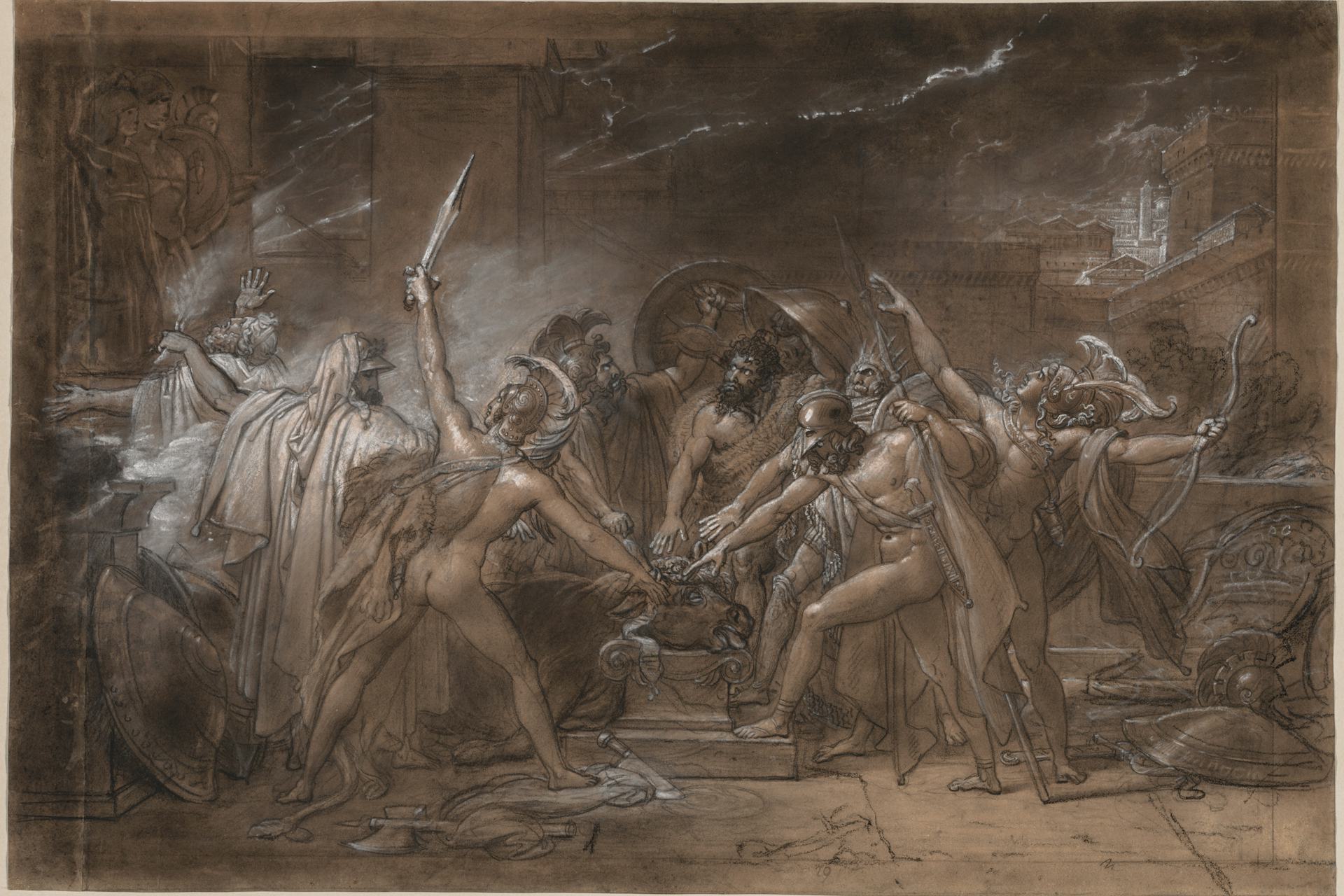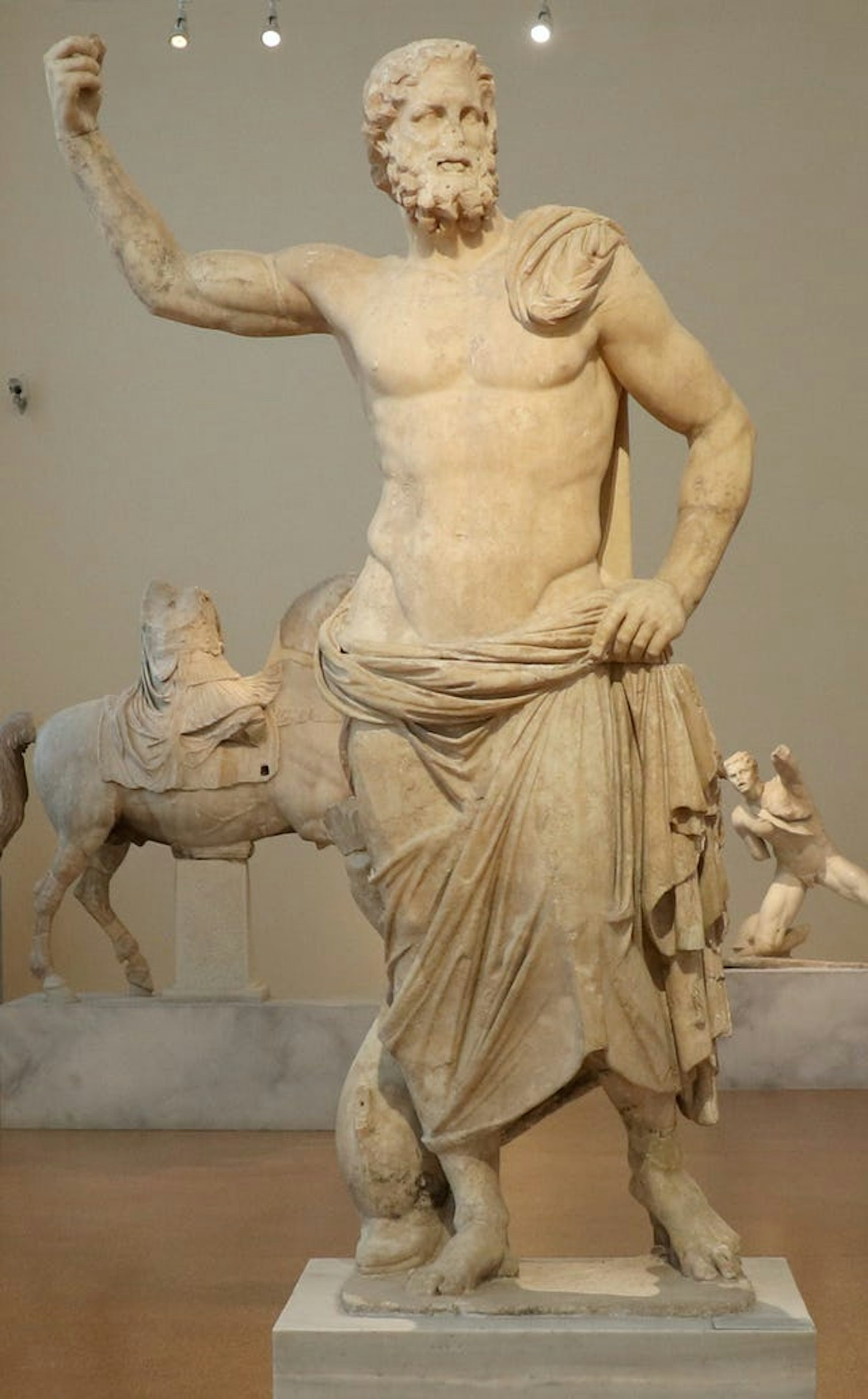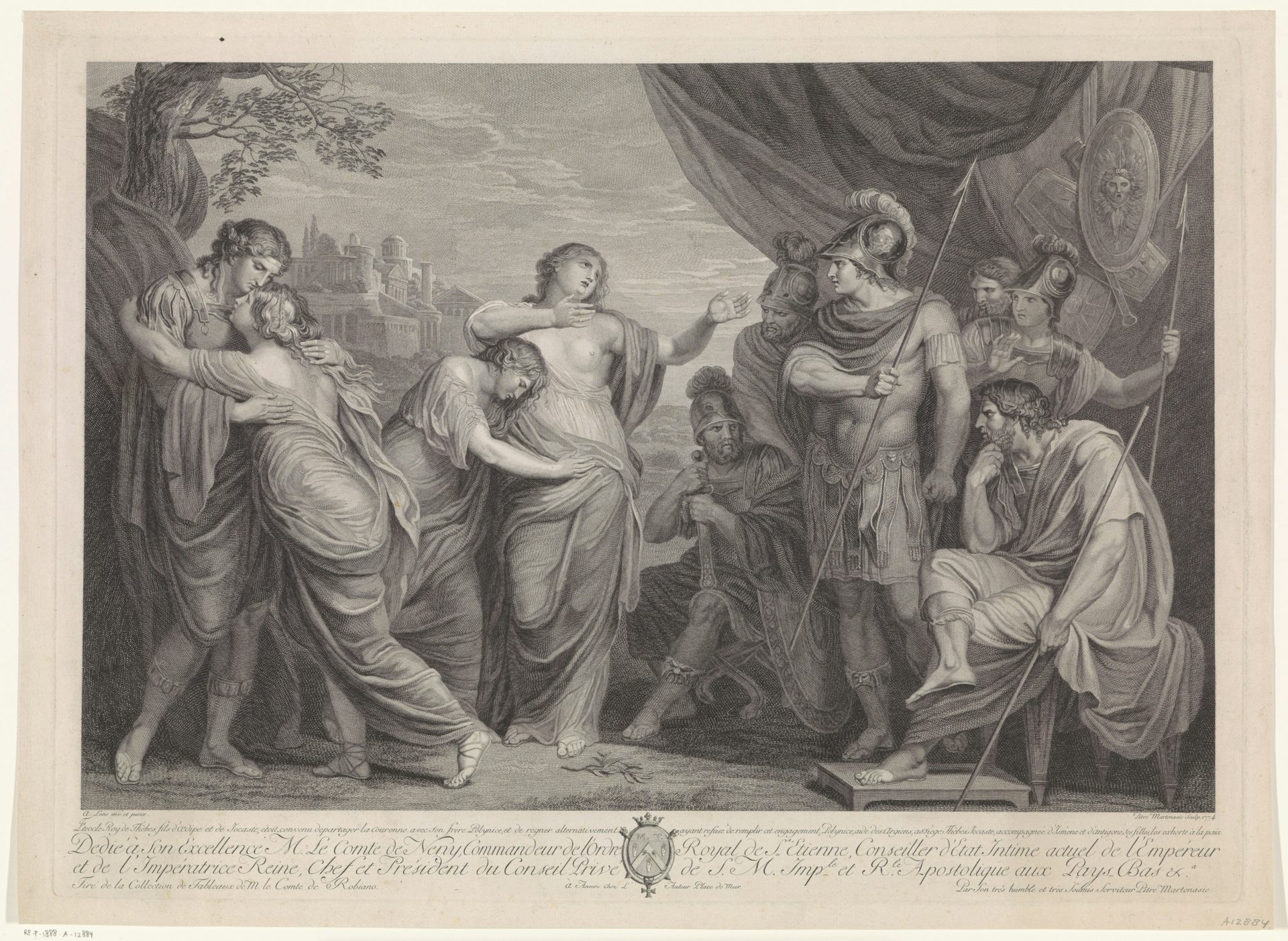Arion

The Oath of the Seven Chiefs against Thebes by Anne-Louis Girodet de Roucy-Trioson (ca. 1800)
Cleveland Museum of ArtCC0Introduction
Swift and immortal Arion was a horse owned by Adrastus, the king of Argos. Arion was typically described as the offspring of Poseidon and Demeter, two of the most important Greek gods; he was born after they laid together in the form of horses. Given his impressive pedigree, Arion was no ordinary horse. He was endowed with extraordinary speed and, in some accounts, could even speak and prophesize.
Over the years, he belonged to several heroes but was best known as the horse of King Adrastus, who led the catastrophic war of the Seven against Thebes. Thanks to speedy Arion, Adrastus was the only one of the seven to escape the battlefield alive after their defeat.
Etymology
The name “Arion” (Greek Ἀρείων, translit. Areíōn; sometimes spelled Ἀρίων/Aríōn or Ἐρίων/Eríōn) may be etymologically related to Greek words denoting superiority, strength, or value (though the name is not necessarily derived from those words). For example, “Arion” bears similarities to ἀρείων (areíōn, “better, stronger”), ἄριστος (áristos, “best, noblest”), ἀρετή (aretḗ, “excellence”), and ἄρος (áros, “advantage”).[1]
Pronunciation
English
Greek
Arion Ἀρείων (Areíōn) Phonetic
IPA
[uh-RAHY-uhn] /əˈraɪ ən/
Attributes
General
Arion was a horse descended from the gods. Homer described him as a “swift horse…of heavenly stock,”[2] and these qualities—speed and divinity—appear to have been the creature’s defining attributes.
The common tradition imagined Arion as a dark horse, or at least as dark-maned. Early accounts thus referred to him with the epithet κυανοχαίτης (kyanochaítēs), meaning “dark-haired”—an epithet also used for his father, Poseidon.[3] But according to one late source, the Roman poet Statius, Arion was a golden creature, as fiery in color as in temperament. Statius describes Arion as
marked by his mane of fiery red…Neptune [Poseidon], if the fame of olden time be true, was his sire; he first is said to have hurt his young mouth with the bit and tamed him on the sand of the sea-shore, sparing the lash; for insatiable was his eagerness to run, and he was capricious as a winter sea. Oft was he wont to go in harness with the steeds of ocean through the Libyan or Ionian deep, and bring his dark-blue sire safe home to every shore; the storm-clouds marvelled to be outstripped, and East and South winds strive and are left behind.[4]
The marvelous Arion may have also had the ability to utter prophetic speeches in certain situations,[5] much like Achilles’ horse Xanthus.[6]
There are no sources that speak of Arion’s death—perhaps because he never died. As the offspring of immortal parents, Arion was probably immortal himself.
Iconography
Arion is occasionally encountered in ancient art, especially with his master Adrastus. However, since artists usually showed Adrastus riding a quadriga (a four-horse chariot), and since Arion’s defining characteristic—his speed—cannot be easily represented in the visual arts, he is often indistinguishable from other horses, unless specifically identified by name.
Arion sometimes appeared on the reverse of coins from Thelpusa, the Arcadian town commonly connected with the myth of his birth.[7]
Family
In the standard tradition, Arion was the child of Poseidon and Demeter, two powerful Olympian gods (and, incidentally, brother and sister). In a strange and rather complicated twist, neither of these gods was quite themselves at the time of Arion’s conception, with Poseidon having taken the form of a stallion and Demeter appearing as either a mare or an Erinys (a “Fury”).[8] In other traditions, Poseidon fathered Arion with one of the Erinyes[9] or Harpies.[10]
In another version of Arion’s parentage, the goddess Gaia, the primordial embodiment of the earth, was Arion’s mother, bringing forth the swift horse near the shrine of Apollo in the Arcadian town of Oncium; Poseidon once again appears to have been the father.[11] In other traditions, Poseidon created Arion independently, without a mother.[12]
In yet another tradition—seemingly the only account of Arion’s parentage that does not mention Poseidon—Arion was the child of Zephyrus, the gentle god of the west wind, and one of the Harpies.[13]
Some said that Arion had a sibling who was also born from the union of Poseidon and Demeter, but the name of this sibling is not usually stated.[14]
According to the epic poet Quintus of Smyrna, Arion fathered the horse ridden by the Argive hero Sthenelus in the Trojan War.[15] In another tradition, Agamemnon’s mare Aethe was also a descendant of Arion.[16]
Mythology
Origins
In what appears to have been the best-known account of his birth, Arion was conceived after Poseidon, the god of the sea, was overcome with lust for Demeter, the goddess of agriculture (and his sister). While Demeter was searching the world for her lost daughter Persephone, Poseidon pursued Demeter, hoping to sleep with her. Demeter tried to hide from Poseidon by transforming herself into a mare and grazing among the other horses outside of Thelpusa in Arcadia. But Poseidon found her, transformed himself into a stallion, and had his way with her.

Poseidon of Milos, statue discovered near the Greek island of Milos (125–100 BCE)
National Archaeological Museum of Athens, Athens (cropped and retouched). George E. Koronaios, Wikimedia CommonsCC BY-SA 4.0Demeter acquired two new local titles because of this experience: one was “Erinys,” or “Fury,” because Demeter was furious about what Poseidon had done to her;[17] the other was “Lysia,” meaning “Bather,” because she had bathed in the nearby River Ladon after the rape.[18]
Demeter soon gave birth to two children. One was a daughter whose name was revealed only to those initiated into the local cult of Demeter, but who probably bore the title Despoina, or “Mistress.” The other product of the union was Arion.[19]
There seem to have been some slightly garbled variants of this local tradition, including one in which Demeter took the shape of one of the Erinyes when Poseidon raped her.[20] In other versions, Poseidon fathered Arion with one of the Erinyes or even with one of the Harpies (see above). There was also another tradition, connected with Phigalia (another Arcadian town), in which the only product of the union between Poseidon and Demeter was a daughter known by the cult title Despoina.[21]
There were alternative traditions that transferred Arion’s birthplace from Arcadia to other parts of Greece, especially Thessaly in northern Greece. In these stories, Arion was sometimes said to have been the first horse (or one of the first horses) created by Poseidon, usually by striking the earth with his trident.[22]
In one account, Arion was the horse that Poseidon created when he and Athena were competing for Attica. Poseidon offered the people of the region a horse—Arion—if they accepted him as their patron god, while Athena offered them the olive tree.[23] The people of Attica preferred Athena, angering Poseidon (and possibly bruising Arion’s ego).[24]
Arion and the Heroes
Arion was best known as the horse who saved the life of Adrastus during the war of the Seven against Thebes. But Arion actually served a long line of kings and heroes before he ever came to the stables of Adrastus.
In one tradition, Poseidon first gave Arion to the Arcadian Oncus, who in turn gave him to Heracles. Heracles made use of the swift steed in his duel with Cycnus, the brutish son of Ares, which ended with Heracles killing Cycnus and wounding Ares.[25]
In a gentler variant, the duel was replaced with a horse race that took place near the shrine of Pagasian Apollo—and which Heracles won thanks to Arion. In this account, it was Copreus, the king of the Boeotian town of Haliartus, who gave Heracles the horse.[26] But there was also a tradition in which Adrastus received Arion directly from the gods.[27]
However Adrastus came by Arion, he certainly reaped the glory that came with owning such a remarkable creature. In the inaugural Nemean Games, celebrated in honor of the dead child Opheltes, Arion earned Adrastus first place in the chariot race—though in one tradition the race was won with an empty chariot, as the charioteer, Polynices, was thrown clear by the speeding horse as he dashed to the finish.[28]
It was Arion whom Adrastus rode into battle when he took up the cause of Polynices in the war of the Seven against Thebes. Polynices was one of the sons of Oedipus, the former king of Thebes who learned that he had inadvertently killed his father and married his mother. Polynices and his brother Eteocles fell into a bitter dispute over the throne of Thebes. When Eteocles seized the throne, Polynices raised an army led by seven great heroes—the so-called “Seven against Thebes”—and set out to reclaim what he believed to be his.

Eteocles and Polynices Exhorted to Make Peace by their Mother Jocasta by Pieter Franciscus Martenasie, after Andries Lens (1774)
RijksmuseumPublic DomainPolynices’ attack on Thebes was defeated, however. Six of the seven heroes who fought against the city, including Polynices himself, were killed in battle. Of the seven, only Adrastus escaped with his life, due to the speed of his horse Arion, who carried him away from the bloody battlefield.[29]